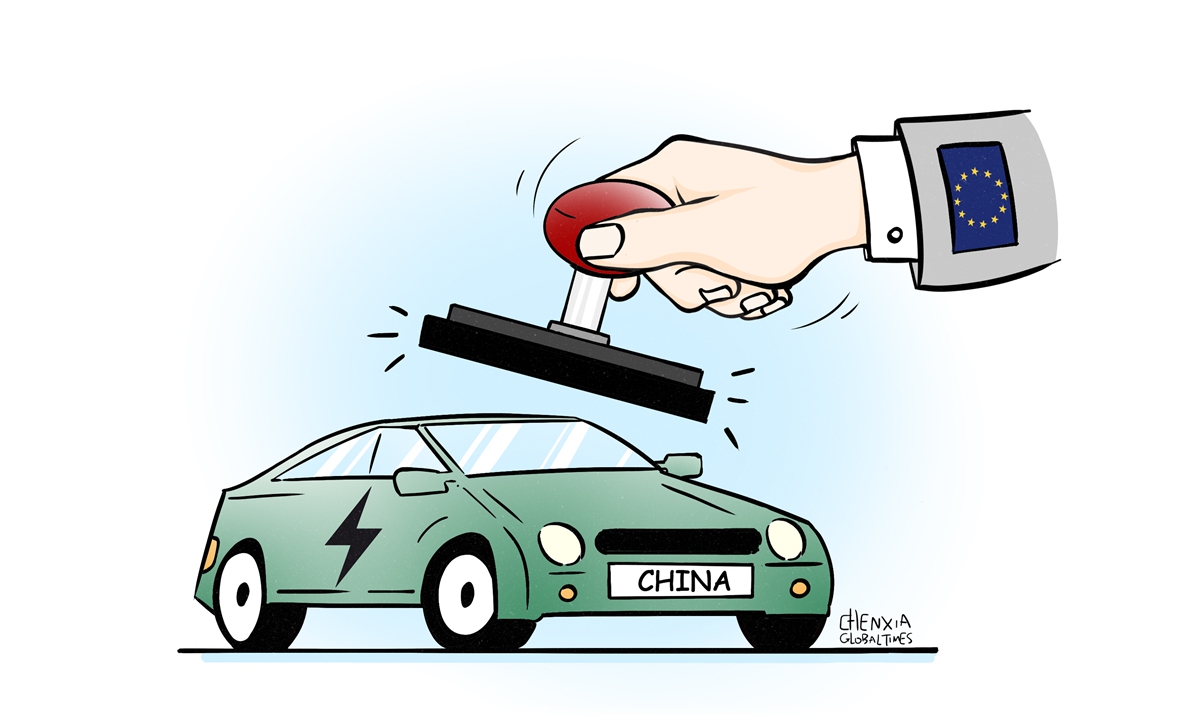
Illustration: Chen Xia/Global Times
The European Commission announced on Wednesday a preliminary ruling on the anti-subsidy investigation of electric vehicles (EVs) imported from China. The EU says it would impose extra duties of up to 38.1% on imported Chinese EVs from July. This is a phased conclusion since the EU launched an anti-subsidy investigation against Chinese EVs in October last year. Unfortunately, this conclusion is extremely unfair, indicating that the European Commission has chosen to surrender to protectionism when faced with facts, rules, and morality. This not only harms the legitimate rights and interests of the Chinese EV industry but also disrupts and distorts the global automotive industry supply chain, including those in the EU.
This "investigation" is actually a presumption of guilt with strong subjective biases, and it has not been conducted in accordance with the investigation mechanism that complies with WTO rules from the beginning. Nevertheless, the Chinese automotive industry has actively cooperated with the investigation from the perspective of maintaining the safety and stability of the China-European automotive industry chain, and relevant companies have provided materials as required by the investigating authorities. However, during the "investigation," the European side selectively chose sample companies, abused the "obtainable facts" rule, arbitrarily expanded the scope of the investigation, and seriously distorted the investigation results. The ruling disclosed by the European Commission lacks factual and legal basis. Rather than calling it a conclusion on Chinese companies, it is more like a clear example of how some Europeans politicized and weaponized economic and trade issues.
Many analysts believe the European Commission's targeting of the Chinese EV industry with tariffs is largely following Washington's lead. Just under a month ago, the US announced an increase in tariffs on Chinese EVs from 25% to 100%, and the European Commission immediately followed suit by targeting Chinese EVs. It is hard to say that this is just a coincidence. As we pointed out in a previous editorial, higher tariffs cannot protect the American automotive industry, and today we must also say that higher tariffs cannot protect the European automotive industry.
In fact, the harm this decision would cause to Europe is not hard to foresee. Previously, countries like Germany, Sweden and Hungary had clearly opposed imposing additional tariffs on Chinese EVs. German Chancellor Olaf Scholz sharply warned that "Isolation and illegal customs barriers — that ultimately just makes everything more expensive, and everyone poorer." Following the European Commission's announcement on Wednesday, there was an immediate surge of opposition within the European business community. Volkswagen Group stated that the negative effects of the decision outweigh any potential benefits for the European, and especially German, automotive industry. "We reject them." Oliver Zipse, Chairman of the Board of Management of BMW, said that this decision for additional import duties is the wrong way to go, and that protectionist measures, such as the introduction of import duties, do not contribute to successfully compete on international markets. Stellantis also said that it does not support measures that contribute to the world fragmentation.
The European Commission's announcement indicates that additional tariffs will be imposed on BYD, Geely, and SAIC Group at the rates of 17.4 percent, 20 percent, and 38.1 percent, respectively, while other manufacturers that participated in the investigation will face a 21 percent tariff. Some analysts believe that, compared to the extreme 100 percent tariffs imposed by the US on Chinese EVs, the EU chose a relatively "compromise" figure. This approach suggests that while the EU acknowledges US pressure, it hopes the market can "absorb" this rate, making it "acceptable" without causing too much backlash. This notion is completely wrong. The issue is not whether companies can "absorb" or the market can "accept" the tariffs, but rather whether the EU will stand on the right side of history by supporting globalization, free trade, and green development, or go against these trends.
It's important to recognize that while some European countries outwardly seek to block Chinese products from entering the European market through increased tariffs, their true intention is to gain an edge in the new wave of intense competition. They hope to drive employment and GDP growth through industrial development. Europe has experienced trade wars multiple times in the past, and historical experience has repeatedly proven that tariffs have never been a solution for maintaining competitiveness. These countries need to learn from history and be more visionary, recognizing and seizing the vast potential and significant opportunities in China-Europe cooperation in a timely manner.
The announcement made by the European Commission on Wednesday is only a preliminary ruling, and there will be a final ruling afterward, which also means there is still a possibility of a soft landing for the widely warned trade war. We call on the EU to immediately correct its erroneous practices and earnestly implement the important consensus reached at the recent trilateral meeting between China, France, and the EU, and to properly handle economic and trade frictions through dialogue and consultation. China's attitude toward problem-solving is sincere, and at the same time, we will closely monitor the subsequent developments on the European side and take all necessary measures to firmly defend the legitimate rights and interests of Chinese enterprises.




